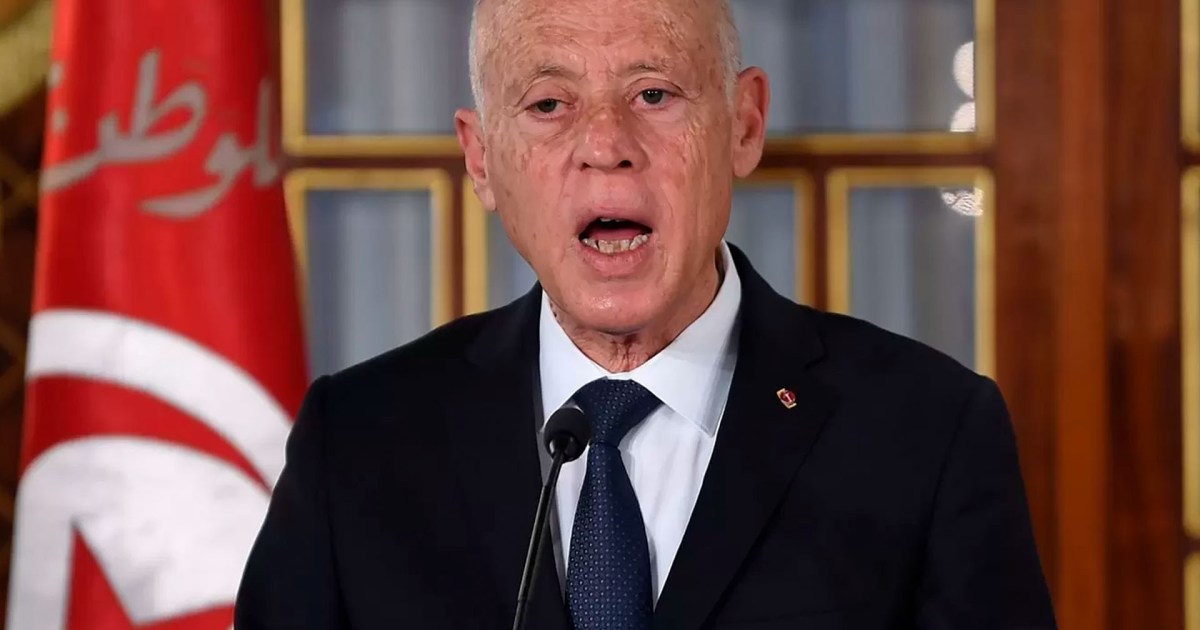Tunisian President Kais Saied said on Friday that "his country will not accept any foreign intervention," as he faced increasing pressure from Western governments to restore constitutional order after seizing power last July.
The Tunisian presidency said that in refuting what it described as allegations, President Kais Saied stressed during his meetings with other foreign delegations that Tunisia is a sovereign country and sovereignty is in it for the people, and there is no room for interference in its choices that stem from the popular will.
The statement added that Tunisia does not accept to be in the seat of the student who receives lessons and then waits for the number to be assigned to him or the note that will be recorded in his preparation card, according to the expression of a statement by the Tunisian presidency.
"The sovereignty of the Tunisian state and the choices of its people were not originally discussed, and they will not be the subject of negotiations with any party," he added.
On July 25, President Saeed issued decisions freezing the powers of Parliament, lifting the immunity of MPs, and dismissing Prime Minister Hisham Al-Mashishi, provided that he himself assumes the executive authority, with the help of a government whose prime minister is appointed.
Most of Tunisia's parties rejected Said's decisions - which he extended on August 24 indefinitely - and some considered them a "coup against the constitution", while other parties supported them, seeing them as a "correction of the course", in light of the (pandemic) political, economic and health crises. Corona).
Western invitations
And earlier on Friday, the European Union's foreign and security policy chief, Josep Borrell, called - after his meeting with President Said - for the return of Parliament and the preservation of the country's democratic gains.
Borrell said - in a statement issued by the European Commission - "I conveyed to the president European concerns regarding preserving the gains of democracy in Tunisia, which is the only way to ensure the stability and prosperity of the country."
He added that the free exercise of the legislative power and the resumption of parliamentary activity are part of these gains, and they must be respected.
The European official stressed the country's leadership towards restoring institutional stability and preserving its democratic principles, according to the statement of the European Commission.
Borrell referred to the European Union's commitment to the consolidation of democracy in Tunisia, respect for the rule of law and basic freedoms, stressing - on the other hand - the European Union's respect for Tunisian sovereignty.
Last Monday, the ambassadors of the Group of Seven major countries (the United States, Britain, France, Germany, Italy, Canada and Japan) called on Tunisian President Kais Saied to quickly appoint a new prime minister and return to the constitutional system in which the elected parliament plays a major role.
Before that, a delegation from the US Congress and another from the White House visited Tunisia, and the two delegations urged the Tunisian president to return to the democratic path and expedite the formation of a new government.
partisan positions
Meanwhile, a number of Tunisian political parties and personalities denounced the statements of the Tunisian President's advisor, in which he expressed the President's intention to suspend the implementation of the 2014 constitution and change the political system.
The Democratic Current Party said - in a statement - that the President of the Republic should clarify his position in this regard, and respect the constitution.
The party rejected what it described as individual attempts to change the social contract and exploit the anger of Tunisians to impose political choices.
The former Secretary-General of the Democratic Current Party and former Minister, Mohamed Abbou, also expressed his opposition to suspending the constitution, and said that its amendment could take place in the light of a future elected parliament, adding that the goal of resorting to Article 80 was to dismantle what he described as the system of political corruption, not to amend the constitution and go. towards a presidential system.
As for the "Tunisia Movement of Will" party, it saw that the statements prove what it called the "revolutionary trend" that the Presidency of the Republic has followed since last July 25.
The Secretary-General of the Republican Party, Issam Chebbi, said that the future of the political system is a national affair, and the President of the Republic may not single out it and modify it to align with his convictions.
On the other hand, a representative of the National Bloc expressed his astonishment at what he described as "the lament of some over the current constitution", describing it as a booby-trapper that divided power and created crises and did not provide solutions to Tunisians, as he put it.
road map
The Tunisian General Labor Union announced what it said was a "road map" prepared by its experts to manage the exceptional phase Tunisia is going through.
The road map suggests accelerating the formation of a mini government of national competencies, in consultation between the Presidency of the Republic and civil organizations.
The union also called for the formation of an advisory body whose task would be to develop a legal vision for reforming the political and electoral systems and the constitution, with the need to set a time limit for exceptional measures and a decisive decision on the fate of the current parliament.
In the economic field, the plan proposes launching urgent economic reforms and preparing a supplementary budget for the current year, in addition to the necessity of scrutinizing the country's current financial situation and the ways of disposing of loans obtained by Tunisia.

